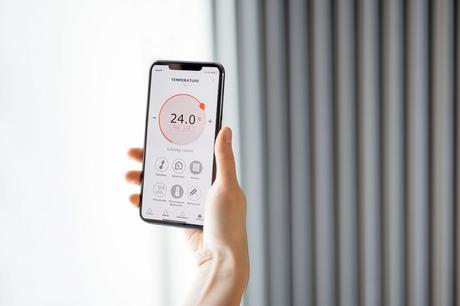What we’ll cover…
- What to expect from AI heating: A prediction of how AI might integrate with home heating systems.
- Which heating devices could embrace AI: An overview of the heating devices we expect to utilise AI most readily.
- AI-infused smart thermostats: Looking at how AI may enhance thermostat functionality.
- Adaptive learning: How smart thermostats, through AI integration, could learn user preferences for personalised comfort.
- Energy efficiency: The potential role of AI in optimising energy consumption and reducing costs.
- Predictive maintenance: The ways AI might be used to foresee and address potential heating system issues.
- Integration with smart home ecosystems: An exploration of how AI heating systems could communicate with other smart devices for seamless control.
Artificial intelligence in home heating systems
As artificial intelligence continues to quite literally change the world with an emerging presence in practically every sector, its integration into home heating systems seems an inevitability of the future.
At BestHeating, we’re excited to see how these cutting-edge developments could revolutionise the home heating landscape via an advent of smart radiator arrivals and AI-driven temperature controls and settings.
In this article, we’ll explore the ways in which we expect AI to infiltrate into the world of radiators and beyond, and ultimately align with our mission to make heating cooler.

The start of the smart heating revolution
Whilst traditional radiators have served well for a very long time, the start of the smart heating revolution is already upon us.
Radiator technology has advanced significantly with the introduction of a variety of smart heating options, and affordable modern electric heating designs such as ceramic core radiators, dry thermal radiators and much more.
And with heating developments tying in with the rapid rise of AI across virtually every application imaginable, the future of smart radiators is an exciting one that is likely to offer an unprecedent level of control and efficiency to users.
How might heating devices use AI?
Although a little conjecture has to be involved, we’ve been in this game long enough to have a decent idea as to which sort of home heating devices are most likely to embrace AI technology as quickly as possible. Below is a brief overview of how we expect various heating styles to be at the forefront of artificial intelligence in heating…
AI-infused thermostatic radiator valves
It is reasonable to suggest that radiator valves can front up an initial AI foray into the heating world, with the technology appearing to be easiest to incorporate within such devices.
An AI-powered TRV would utilise machine learning algorithms to work out room usage patterns, and adjust heating settings in accordance. In contrast to traditional thermostatic radiator valves, these smart valves could have the facility to:
- Predict the occupancy of a room and pre-heat the space just before it is required
- Automatically decrease the temperature of unused areas
- Learn habits and make adaptations based on your lifestyle without manual programming
Predictive practices with AI heating
Outside of simple scheduling means, artificial intelligence technology has the potential to deliver predictive heating advantages previously unheard of. AI algorithms might conduct an analysis of several data points to analyze how home heating is used from day to day. These can include:
- Local weather forecasting
- The thermal characteristics of a property
- Historical patterns of heating use
- People or room occupancy detection in real time
These benefits would allow an AI-enabled heating system to anticipate the needs of a household and the individuals within it, making proactive alterations when necessary to provide the utmost comfort whilst maximising energy efficiency.

AI heating for optimal energy efficiency
If, like me, you’re still sore about the whole Oasis ticket debacle (not bitter at all), then you might never want to hear the phrase ‘dynamic pricing’ again. However, it would seem that as it relates to AI heating, ‘dynamic energy pricing’ might just be a buzz phrase to be seen in a far more positive light.
Essentially, modern radiators infused with AI could have the capability to integrate with real-time dynamic energy pricing, so homes can be heated in alignment with the lowest electricity rates. This would cut energy costs whilst also alleviating pressure on the national grid.
Integrating AI into full home heating systems
Expect artificial intelligence to have the capacity to integrate seamlessly with a wider smart home ecosystem setup. AI-driven radiators may be expected to facilitate smooth communication with:
- Window and door sensors
- Smart digital thermostats
- Person and occupancy detectors
- Location-enabled smartphones and tablets
This level of connectivity can provide a holistic approach to home climate control. Essentially, all devices and appliances would be able to operate in tandem to deliver peak comfort and efficiency levels.
What advantages might AI heating provide?
- Improved comfort – Individual rooms that can be heated up to align with your schedule, personal preferences and requirements.
- Energy savings – Intelligent heating management could reduce energy consumption significantly. Estimations from a study conducted by Exergio suggest that AI integration into the building sector can cut energy consumption by between 8 and 19% (click here to find more details on this study). Although we are only working with estimations currently, it is expected that an even bigger impact could be made via AI home heating, with energy reductions of up to 30% thought possible.
- Convenience – Systems might have the capacity to learn behaviour, so minimal user intervention would be needed. You would essentially be able to ‘set and forget’ about your heating for the day, week, month, or even your year. AI’ll be there for you.
- Environmental impact – Decreased energy usage can lead to a less impactful carbon footprint.
- Cost-effective operation – Although the initial purchase price is likely to be significantly higher compared with traditional systems, the cost-effective operation of AI heating options would lead to hefty long-term savings.

Modern heating styles from BestHeating
BestHeating are always committed to delivering the very latest in heating technology, and take our mission to make heating cooler with great affirm. In the interim of AI-powered heating systems being readily available as the technology continues to evolve, there’s an impressive selection of smart heating styles on offer that are paving the way for further exciting developments.
Modern electric heaters – Several of our modern electric heaters feature smart controls, rendering them ready and capable of integration alongside existing home automation systems.
Smart thermostats – Our choice of WiFi-enabled smart thermostats can provide a glimpse into the future of what AI heating is set to offer. Compatible with Google Home and Amazon Alexa devices, they enable remote temperature adjustments via smartphone, and preserve energy with manual and programmable modes for different scenarios.
WiFi-enabled heated towel rails – Explore the ECOSO options in our electric heated towel rail collection. Ideal for bathroom spaces, these sleek and stylish contemporary options can also be controlled remotely and integrate seamlessly with smart home setups.

Future home heating AI innovations
As AI technology continues to evolve and advance, it only makes sense to expect further futuristic innovations in home heating moving forwards. Some developments we can envisage are listed as follows:
Self-Diagnosing Systems: Radiators that can detect issues and schedule maintenance automatically. A smart radiator could be equipped with sensors to monitor its performance continuously. The AI system would analyze this data whilst real-time usage occurs. If it notices an unusual pattern, like a gradual reduction in heating efficiency or an irregular flow rate, it can alert you via a smart device notification. The message might read, “Potential issue detected in living room radiator. Maintenance check recommended.” There might even be the prospect of a system being able to automatically contact a local heating professional to arrange an inspection in severe cases, ensuring fast attention and the prevention of a full system malfunction.
Voice-Activated Controls: Adjust your heating with simple voice commands to the likes of Amazon Alexa, Google Assistant or Apple’s Siri. Imagine returning home from work on a particularly cold day. Upon entering the house, you say, “Alexa, put the living room temperature to 70 degrees.” In response, the AI-infused heating system could immediately alter the heating setting to the stated temperature. There might also be the possibility to make more complex requests such as, “Alexa, lower the bedroom temperature by four degrees at 10.30pm tonight,” and the system will schedule this adjustment automatically for the time specified.
Health and Wellbeing Integration: Systems that adjust based on your health data, ensuring optimal comfort for better sleep and productivity. Smart watches are able to track your sleep patterns and body temperature. In cohesion with AI heating, this data may be used to adjust your bedroom temperature whilst you sleep. For instance, if it is detected that you’re entering a state of deep sleep, an AI heating system might lower the temperature accordingly to promote better sleep quality. When waking up in the morning, the temperature could gradually increase to help you feel more alert and productive for the day ahead.
Keep up with the latest heating news from BestHeating
Who knows just when to expect the aforementioned AI developments to make a splash in the world of home heating? What does seem certain is that the future of heating is smart-based, efficient and tailored to the exact needs of the user. AI-driven temperature control and smart radiator functionality would appear to have the potential to redefine home comfort, and provide an unprecedented level of energy saving and customisation options.
BestHeating will be on hand to report on the very latest innovations as and when they happen, and with artificial intelligence surging throughout every sector, hope to be able to offer such advanced heating products sooner rather than later.
Want to have your say on how AI might change the shape of the home heating landscape forever? Leave your thoughts in the comments section below, or contact us via Instagram, Facebook or X.
Frequently Asked Questions
bWill AI heating be compatible with existing smart home devices?
It is expected that AI heating systems, like existing smart heating devices, will be designed to integrate seamlessly with popular home ecosystems.
Expect the likes of Google Home and Amazon Alexa devices to incorporate AI heating integration as and when it becomes available.
To learn more, explore our full article, How could AI integrate into home heating technology?
Share View FAQ Page bHow much energy could an AI heating system save?
As with much talk around AI heating systems, conjecture must be involved in working out how much energy can be saved.
However, as with current smart heating setups, it is expected that significant savings can be made, and that AI integration in heating systems may reduce energy consumption levels by 8-30%, dependent on specific technology and usage patterns.
To find out more, browse the full article, How could AI integrate into home heating technology?
Share View FAQ Page bWhat is AI heating?
AI heating would be a form of smart home heating that would utilise artificial intelligence to learn the preferences and habits of a user, in addition to the characteristics of a home to automatically alter temperature settings for optimal efficiency and comfort.
It is expected that AI heating could embrace and improve the likes of voice activated controls, health and wellbeing integration facilities, and self-diagnostic features into the future.
For a more detailed insight, browse our article, How could AI integrate into home heating technology?
Share View FAQ Page
